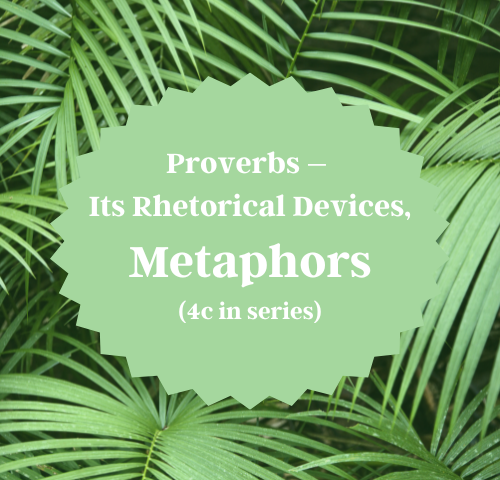Unleashing Your Potential: Mastering the Art of Maximizing Success and Minimizing Failure
May 20, 2023Liberando Su Potencial: Dominando el arte de maximizar el éxito y minimizar el fracaso
May 25, 2023PROVERBS: GPS to a Better Life
Blog Series #4c: Proverbs – Its Rhetorical Devices
Metaphors
…continued…
Blog 4c in Series
“The flowering moments of the mind drop half their petals in our speech.”
– Oliver Wendell Holmes
One of the most beautiful and striking metaphors in Proverbs is found in chapter 25, verse 11: “A word fitly spoken is like apples of gold in settings of silver.” This metaphor compares the impact of well-chosen and timely words to the beauty and value of apples of gold set in a framework of silver: a striking image to visualize. This beautiful metaphor underscores the power of words to inspire, comfort, and uplift individuals, making it a timeless and valuable lesson for all.
The phrase “A word fitly spoken…” is significantly important in communication and interpersonal relationships. It implies that the way we communicate, including the words we choose, the tone we use, and the timing of our communication, can profoundly impact our interactions with others. This is especially true when our emotions are a bit flared. For example, the following is an excerpt from Jay Heinrichs’ book “Thank You for Arguing” involving interaction between his son and him:
It is early in the morning, and my seventeen-year-old son eats breakfast, giving me a narrow window to use our sole bathroom. I wrap a towel around my waist and approach the sink, avoiding the grim sight in the mirror; as a writer, I don’t have to shave every day… But I do have my standards…and hygiene is one. I grab a toothbrush and toothpaste. The tube is empty. The nearest replacement sits on a shelf in our freezing basement, and I’m not dressed for the part.
“George!” I yell. “Who used all the toothpaste?”
A sarcastic voice answers from the other side of the door. “That’s not the point, is it, Dad?” George says. “The point is how we’re going to keep this from happening again.”
He has me. I have told him countless times how the most productive arguments use the future tense, the language of choices and decisions. “You’re right,” I say. “You win. Now will you please get me some toothpaste?”
“Sure.” George retrieves a tube, happy that he beat his father in an argument. (Heinrichs)
The above interaction between Jay and his son, George, could have escalated into a heated exchange. George’s sarcastic reply could have served to fuel Jay’s annoyance over the empty toothpaste tube. Jay could have responded negatively by scolding his son. Let’s remember we were all teenagers at one time in life. We may not have been “a wild child,” but our man-eating giant squid flailing raw tentacles of unpredictable emotional nerves certainly had our parents on edge at times. And then we grew up and had teens-squids of our own. The bottom line is this, Jay chose his words carefully, and it was a win-win situation: Jay got the toothpaste, and George felt empowered. Thus, the metaphor of “apples of gold in pictures of silver” is significant because gold symbolizes wealth, power, and prestige, while silver symbolizes purity, clarity, and strength. It is certain that the interaction between Jay and his son was a memorable moment of communication: why else would Jay write about it?
In contrast, the opening quote by Oliver Wendell Holmes emphasizes the challenge of expressing ourselves effectively, but not offensively. The idea that “…flowering moments of the mind” lose “half their petals” speaks to the reality that we should think carefully before we blurt out the first thing that comes to our minds. We need to realize that we need the wisdom of God to help us in all forms of communication. Especially in speech because language is inherently limiting, and the slight inflection can change the meaning of what we’re saying at any given moment. Therefore, by paying attention to our words and continually striving to improve our communication skills, we can become better individuals and create a more positive environment for ourselves and our loved ones.
Next week we will delve into wordplay in this series: Proverbs – Its Rhetorical Devices
Questions for Discussion:
1. The interexchange between Jay and George, what are your thoughts? How would you have handled the situation?
2. Do you think that George needed a lesson in how to be respectful and not sarcastic?
3. Share a situation between you and another person – family, friend, or non-friend – when choosing your words carefully was most critical.
Works Cited Heinrichs, Jay. Thank You for Arguing:; What Aristotle, Lincoln, and Homer Simpson Can Teach Us… n.d

Loretta Huggins, born and raised in San Francisco, CA, has served in the ministry with her husband, Larry Huggins since 1989: administrator, hostess, event planner, and teacher. She has traveled to eighteen countries. She is the co-founder and co-pastor of ZChurch.




